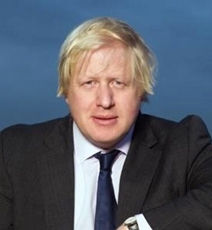Pound plummets as London Mayor Boris Johnson backs Brexit
23 Feb 2016
As politicking on Britain's membership of the 28-member European Union heats up, the pound sterling saw its biggest drop in more than a year against the dollar today, hours after the popular London mayor Boris Johnson (BoJo) lent his considerable weight to Brexit - Britain departing from the European Union.
 The pound fell 1.65 per cent to $1.4167 - the biggest one-day drop since 2 January 2015. Against the euro, it hit a 7-year low of $1.4057. Fears of a Brexit have already pushed the pound down by 3.9 ;per cent against the US dollar this year, and analysts are expecting it to hit $1.30.
The pound fell 1.65 per cent to $1.4167 - the biggest one-day drop since 2 January 2015. Against the euro, it hit a 7-year low of $1.4057. Fears of a Brexit have already pushed the pound down by 3.9 ;per cent against the US dollar this year, and analysts are expecting it to hit $1.30.
Britain will hold a referendum on its membership of the EU on 23 June. A vote to leave the EU will threaten UK's strong credit score, potentially pushing up the cost of government borrowing, Moody's warned on Monday.
The London mayor was formerly counted as a supporter of Cameron, and the withdrawal of his backing left the prime minister furious.
All this has implications not only for London as a major capital of global finance, trade and business, but also for over 800 Indian companies that use Britain as a gateway to Europe.
Industry body FICCI has said some Britain-based Indian companies, closely engaged with Europe, may relocate in a Brexit scenario.
During Prime Minister Narendra Modi's visit to London last November, he highlighted the benefits to India of Britain's presence in the EU. ''As far as India is concerned, if there is an entry point for us to the European Union that is the UK, that is Great Britain,'' he had said.
British Prime Minister David Cameron on Friday sealed a deal for ''special status'' in the EU, paving the way for him to campaign to stay in the bloc in the referendum.
Sam Hill of RBC Capital Markets told BBC, ''With political reaction to Friday's deal looking more mixed than the prime minister would have hoped for, in the short-term it is likely that the exchange rate will be sensitive to news, which is seen to increase the probability of Brexit.''
On Monday, Cameron told parliament that a vote to leave the European Union would be ''a great leap into the unknown'' at a perilous time for Britain and the West.
As the political battle for Britain's future entered high gear, Cameron told lawmakers that membership in the 28-nation EU boosted the country's economy and security.
He told the House of Commons that in the face of threats including Russia's muscle-flexing President Vladimir Putin and Islamic State group attackers in the Middle East, ''this is no time to divide the West''.
''Leaving the EU may briefly make us feel more sovereign,'' he said, but argued the UK would be ''stronger, safer and better off'' within the EU.
Cameron said a deal he struck on Friday with 27 other EU leaders gives Britain ''special status'', exempting the UK from ever-closer political bonds within the bloc and protecting the rights of the pound against the euro currency used by 19 EU countries.
But Cameron's Conservative Party is deeply split on the issue, with as many as half its 330 legislators - and at least six of the 23 Cabinet ministers - in favour of leaving the EU.

















